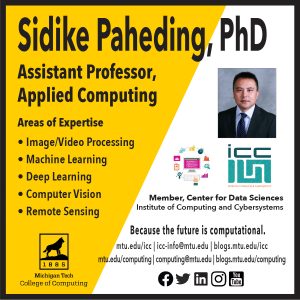Be Innovative. Be Active. Be Effective. This is College of Computing Assistant Professor Sidike Paheding’s teaching philosophy.

New to the Department of Applied Computing this fall, Paheding’s teaching interests include digital image processing and machine learning. This academic year he is teaching SAT3812 Cyber Security I.
A member of the Institute of Computing and Cybersystems’s Center for Data Sciences, Paheding’s research seeks to develop novel AI-driven technologies. His primary interests are image/video processing, machine learning, deep learning, computer vision, and remote sensing.
Paheding comes to Michigan Tech from Purdue University Northwest, where he was a visiting assistant professor in the ECE department Prior to that, he was a postdoctoral research associate and assistant research professor in the Remote Sensing Lab at Saint Louis University from 2017 to 2019.
Paheding is an associate editor of the journals, Signal Image and Video Processing (Springer) and Photogrammetric Engineering and Remote Sensing (ASPRS), and topic editor for Remote Sensing. He completed his Ph.D. in electrical engineering at University of Dayton, Ohio.

Computing is a part of my life.
Active Research
Title: Cybersecurity Modules Aligned with Undergraduate Computer Science and Engineering Curricula
Sponsor: NSF
PI at Michigan Tech
Duration: July 2020 – June 2022
Total Award: $159,417.00
Research Abstract
This project aims to serve the national interest by improving how cybersecurity concepts are taught in undergraduate computing curricula. The need to design and maintain cyber-secure computing systems is increasingly important. As a result, the future technology workforce must be trained to have a security mindset, so that they consider cybersecurity during rather than after system design.
This project aims to achieve this goal by building plug-and-play, hands-on cybersecurity modules for core courses in Computer Engineering, and Computer Science and Engineering. The modules will align with the curricula recommended by the Association for Computing Machinery and will be designed for easy adoption into computing programs nationwide. Modules will be designed for integration into both introductory and advanced courses, thus helping students develop in-depth understanding of cybersecurity as they progress through their computing curriculum. It is expected that the project will encourage more students to pursue careers or higher degrees in the field of cybersecurity.
Recent Publications
Sidike, P., Sagan, V., Maimaitijiang, M., Maimaitiyiming, M., Shakoor, N., Burken, J., … & Fritschi, F. B. (2019). dPEN: deep Progressively Expanded Neural Network for mapping heterogeneous agricultural landscape using WorldView-3 satellite imagery. Remote Sensing of Environment, 221, 756-772. [Impact Factor: 9.085]
Sidike, P., Asari, V. K., & Sagan, V. (2018). Progressively Expanded Neural Network (PEN Net) for hyperspectral image classification: A new neural network paradigm for remote sensing image analysis. ISPRS journal of photogrammetry and remote sensing, 146, 161-181. [Impact Factor: 7.319]
Sidike, P., Asari, V. K., & Alam, M. S. (2015). Multiclass object detection with single query in hyperspectral imagery using class-associative spectral fringe-adjusted joint transform correlation. IEEE Transactions on Geoscience and Remote Sensing, 54(2), 1196-1208. [Impact Factor: 5.855]
Maimaitijiang, M., Sagan, V., Sidike, P., Hartling, S., Esposito, F., & Fritschi, F. B. (2020). Soybean yield prediction from UAV using multimodal data fusion and deep learning. Remote Sensing of Environment, 237, 111599. [Impact Factor: 9.085]